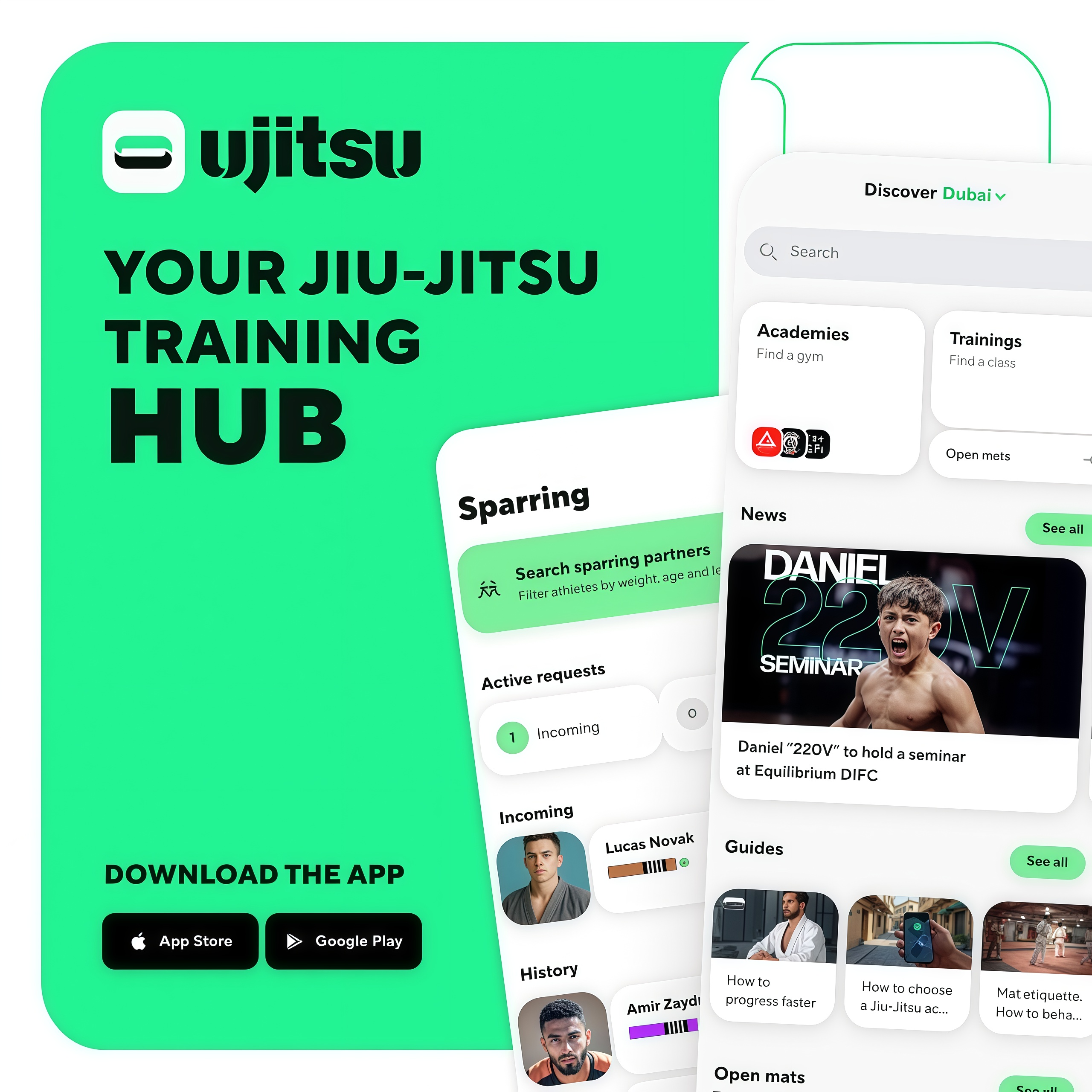You’ve seen it on t-shirts, iron-on patches, tattoos, cheesy Facebook posts: “BJJ saved my life.” It’s a claim turned slogan for a sport we all love. It’s something to celebrate. And it raises the question: how? How is squirming around on a sweaty mat supposed to save anyone’s life?
Most of the time, people focus on a few obvious benefits. Jiu-jitsu is something to care about that’s not your job. It’s a skill you can get better and better at. You get to see returns for your hours well spent – a little justice in the world. And (if you pick the right gym) it’s a great way to make friends and build community. This is all well and good, but not exactly unique to BJJ. Most hobbies offer the same perks. You can take satisfaction in honing your prowess as a birdwatcher, or bicker with your knitting circle till the cows come home. There are innumerable options for how to spend your time meaningfully. And yet some significant number of people have gravitated specifically towards a combat sport. We still don’t have an answer to the question: what are they getting out of BJJ, and why does it matter so much to them?
One popular answer is, in a word, empowerment. When you know how to defend yourself, you can face the world with a kind of basic self-confidence. It can help you feel a little less at the mercy of others for your physical safety. You can stand up for yourself a little more often, because you know you’re not helpless if things go south. This is especially popular as an explanation for why victims of abuse or acts of violence may feel drawn to BJJ, or why some mental health professionals recommend it as therapeutic exercise. If you’ve been made to feel like you are in constant danger of being physically hurt or dominated and there’s nothing you can do about it, training in combat sports can address that belief directly. They can help people struggling with traumatic experiences discover their own latent power to protect themselves – or so the story goes.
While some research does suggest that combat sports promote feelings of self-confidence and independence, I’m not convinced that “empowerment” is the best answer for what BJJ has to offer. Most of these positive effects are seen in long-term practitioners – in fact, with newer players, we sometimes see the reverse. A fresh white belt may spend 45 minutes drilling one or two techniques, only to forget them the second they turn to live rolling. Even with considerate training partners, they may find themselves continually stuck in pins and unable to stop their guard from getting passed. Before they get to experience the satisfaction of being competent and able to defend themselves, they will have to experience, over and over again, their lack of competency and inability to defend themselves. Paul Linden, an instructor of Aikido, observes how people with prior experiences of violence or abuse may find these initial stages of training especially difficult to work through:
“Survivors often walk onto the mat scared and approach each technique with the deep belief that they are weak, awkward and cannot succeed. As a result, their movements are weak and ineffective, so survivors do indeed experience failure as the practice. Many quit aikido because of this. Of course beginning aikidoka actually are weak and awkward. Since beginners cannot actually keep an attack form penetrating their defenses, practice often reinforces survivors’ feelings that they have no boundaries and cannot keep anything out. Aikido practice is often intolerable for abuse survivors because, having poor boundary control, they experience every aikido attack as a deep intrusion rather than just a simple self-defense practice.” (“Abuse Survivors in Aikido Class,” Aikido Journal, 11/25/2012)
So if BJJ isn’t always empowering, or at least doesn’t always feel that way right off the bat, what’s the point? I want to give one answer that I think is more consistent (and also more interesting). It comes from a branch of philosophy called “personalism.”
Personalism is a way of thinking about values—what matters to us and why. We might assume we get our values from our parents or culture, or choose them for ourselves. Personalists claim something different: by virtue of being the particular person I am, certain things are supposed to matter to me more than others. The way things should matter to me is prescribed by my nature. A healthy dog will eat meat or kibble when it’s hungry, while a sick dog (physically or otherwise) may not; when hunger and food don’t matter to the dog in the right ways, things are going badly for it. According to the personalists, something similar is true of us and our values. I should be able to recognize beautiful art and tasty food as good. When I think about doing something cruel or cowardly, that should strike me as bad. And if someone close to me is dying and I don’t care, or if I care more about the weather or buying a pack of smokes, something’s going wrong with my life. Ethically speaking, I’m not in a healthy state.
One such personalist, Edith Stein, goes into more detail about how things can go wrong with our values. Sometimes, due to circumstances outside our control, we may not be able to grasp certain values like we should. If I live in a time and place with no beautiful art, landscapes, or people, then I’ll never know what the experience of beauty is like. I’ll never find out how important beauty is, or how much it matters to me, relative to other things. This is ultimately bad, according to Stein, because it prevents me from fully becoming the person I am. She writes:
“It is conceivable for a man’s life to be a complete process of his personality’s unfolding; but it is also possible that psycho-physical development does not permit a complete unfolding, and, in fact, in different ways. He who dies in childhood…cannot unfold ‘himself’ completely… He who never meets a person worthy of love or hate can never experience the depths in which love and hate are rooted. To him who has never seen a work of art nor gone beyond the walls of the city may perhaps forever be closed the enjoyment of nature and art together with his susceptibility for this enjoyment. Such an ‘incomplete’ person is similar to an unfinished sketch.” (On the Problem of Empathy, trans. Waltraut Stein, p. 111)
It seems obvious to me that this is especially prone to happening with the value of physical power. Under normal circumstances, physical power should strike us as good. This may be especially obvious to people with athletic experience. It feels good to be strong. It’s pleasant to be able to do things that require physical power, and not just because it’s useful – it’s a form of health, a kind of excellence. And it’s also pleasant to see other people do these things. It’s normal to admire strong people or feats of strength. Sometimes we may envy them, but just as often we can enjoy a sense of awe. When things are going well for us, these are some of the ways we appreciate the value, or basic goodness, of physical power.
Unfortunately, it’s not uncommon to see physical power in a very different light. More often than not, people’s formative experiences of physical power are the context of being dominated, intimidated, or overpowered. We weren’t all the targets of the schoolyard bully, but we’ve all seen how he can make a room go silent just by tensing his jaw. This affects how we perceive power in our day-to-day lives. Suppose I walk into a bar and see someone much larger and more muscular than myself. I may clock him as a potential threat. When I’m focused on the risk he could pose to my safety, I’m largely blind to the fact that he is impressive. It’s harder for me to notice the excellence of that other person. And it’s easy to see why victims of violence or abuse would be especially prone to having the value of physical power distorted in this way. Paul Linden again makes insightful observations about this from the instructor’s perspective:
“Survivors reject power…[because] they experienced brutality and saw it as power. Since they believe that power i[s] necessarily vile, they reject gaining power even while they desperately wish to be powerful enough to feel safe…It is important for instructors to point out to survivors that there is a difference between counterfeit power, which is harsh, rigid and insensitive, and true power…which is kind, yielding an[d] empathetic.” (“Abuse Survivors in Aikido Class,” Aikido Journal, 11/25/2012)
Someone forced to experience “brutality” in place of “true power,” as Linden calls it, is being deprived of certain goods. It’s easy to see how they’re stuck living in a world with more occasions for fear and fewer occasions for appreciation and awe. For a personalist like Stein, though, the harm runs deeper. Stein believes we become more fully the people we are by experiencing our full range of values. When I’m built to experience power as a good, but some memory of fear or injury blocks me from having this kind of experience, I am being stunted as a person. The person who can only see the world in terms of brutality is being deprived of something that would make their life not just happier, but fuller – as Stein puts it, they’re forced to remain “an incomplete sketch.”
How do we get someone out of this unhappy state? My suggestion is that combat sports can help us restore our sense of physical power as a good. In a study based on six interviews with world- ranked top 100 female MMA athletes, Mark Mierzwinski notes how consistently they claim to enjoy the sport as an “opportunity to experience violence.” Specifically, they talk about finding it particularly valuable to get to fight within a “safety net” of control, produced both by the rules of the sport, and by the care and concern one’s training partners show for one’s safety. In such circumstances, they say, fighting itself becomes a pleasurable experience, a kind of “buzzing.”
Similarly, a study of veterans who practice MMA and BJJ to alleviate the symptoms of D-PTSD
found that they enjoy the same feelings of pleasure and release while fighting, once again due to the safety and control that their settings and fellow participants afford them. When it becomes more and more clear that “brutality” is absent, space opens up for experiences of health, exuberance, and other positive values to enter the fray. As one veteran described his experience:
“It is… that fight or flight thing kicks in. And that’s kinda cool, but it’s, it’s this like safe or whatever. Like my friend picks at me, he calls it a, your little warrior mode kicks in or whatever it is. Like, you’re not really like, it’s, it’s right now. It’s like kinda, it’s kind of tamed as that like low level and stuff. What you’re getting comfortable with the contact is like, everybody’s scared to get hit until they get hit. I’m like, oh, that’s not so bad. They’re not scared of it no more. So, there’s like, yeah, you still don’t want to get hit, but now, like you, you felt it, so like it’s, it’s much worse in your head, that actuality stuff.”
It seems to me that BJJ is uniquely well designed for this purpose, too. A roll progresses as both players try to advance to better and better positions, while mitigating the risk of the opponent doing the same. I think I see an opportunity to move from half-guard to mount, so I try to execute a particular technique for doing so. Maybe I collect a cross-face and shift more of my weight forward. My training partner recognizes what I’m doing and tries to respond. Maybe if I’m focusing less on what his hips are doing, he sees an opportunity for a sweep. I get a very physical sense of my own power – not sheer strength, but my ability to execute a plan – as well as his.
When I get the pass, I get to enjoy a minor sense of competency, and when I’m thwarted, I get to appreciate that of my partner. There’s a culture of encouragement and appreciation in many gyms, but BJJ itself has features that are particularly conducive for this, too. The pace at which a pass happens, a match progresses, or a submission is completed is often slow enough to appreciate the significance of a tiny change in angle or shift in weight. The body-to-body contact, too, also makes these moments easier to recognize than in other sports. When I’m being off-balanced, I often have the chance to reflect and notice, for instance, “His hook is keeping me from getting settled. That’s why I’m losing this exchange.”
Does this all sound like what you get out of BJJ? When you show up to open mat or check out a match as a spectator, do you feel like it puts you in touch with something good about yourself and your friends? Do you think it’d be harder to recognize that something without BJJ? If so, you have one more reason to drag your bookworm friends to a trial class, or get them to catch an afternoon of ADCC with you. Just one glimpse at the joy and exuberance of “true power” could be just what they need to bring themselves to completion, to go from works-in-progress to works of art. Try and get them curious – you might add a big pop of color to their lives!
For more of our opinion pieces on various topics, visit our opinion piece archives.













